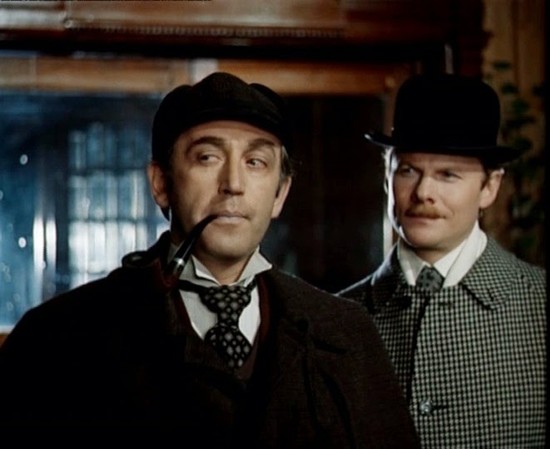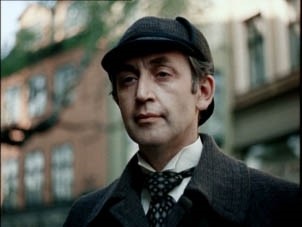© Turkuvaz Haberleşme ve Yayıncılık 2024
Sherlock Holmes is one of those creations that have broken loose from their creators' initial intentions. While for mere mortals "passing into myth" may be a measure of grandeur, for fictive characters like Sherlock, the reverse, something like "passing into reality" is the measure of their impact. You can go visit Sherlock Holmes's house on Baker Street in London, and the many interpretations we have seen on the screen and in fiction almost suggest an original figure that we are still reading and writing fan-fiction about. Many readers will know that his creator Sir Arthur Cannon Doyle tried to kill him off because he was overwhelmed by his character's popularity and had practically become bound to his "creature," not unlike Dr. Frankenstein. But Sherlock's fans were so agitated by his death that Doyle was practically forced to bring him back; in a way, Doyle had to write fan-fiction of his own fiction, pressured by Sherlock's fans for whom Sherlock was more real than his author.

It is no surprise that Sherlock, the master of deduction, found fans outside the borders of Britain, well before his latest reincarnation in Benedict Cumberbatch in contemporary London. Turkish Sultan Abdülhamid is supposed to have been a fan, and there were a number of cases in which Turkish authors brought the great detective to Istanbul where he vies with the Turkish police to solve cases. He has been equally well-liked by our neighbors, the Russians, who have taken a very interesting approach to "adaptation," or "fan-fiction," and who may in fact have created a very strange genre in their 1980s TV adaptation. This adaptation style is somewhat similar to the Italians' spaghetti Westerns, or the Turkish adaptations of Star Trek movies.
The series is called, "The Adventures of Sherlock Holmes and Dr. Watson" - the added Dr. Watson alerting us to the fact that this is not a one-to-one adaptation. We watch Russian actors, speaking in Russian, getting in and out of houses what is supposed to be London and the English countryside; filmed in Riga, Latvia. So, while the stories are as complex and riveting as ever, there is, in watching this Russian version, the extra frisson of trying to assess how good a stand-in the old town of Riga can be for 19th century London. Is that how street signs are supposed to look? Are there as many birch trees in the English countryside? Does that pattern on the iron railing look quite right for London? Are the red velvet curtains in gentlemen's clubs quite so thick in Pall Mall?

The Russian Sherlock films were made in 1979-1986; 11 episodes that appeared in five installments. It seems that Sherlock Holmes is particularly popular with monarchs: Queen Elizabeth proffered a knighthood to Vasily Livanov who played Sherlock, the only Russian (and that in the communist period) to have received the honor. From the acting to the costumes, to the way the scenery has been chosen and doctored to resemble England, it is an immaculate production directed by Igor Federovich Maslennikov. The fact that a lot of rethinking and original ideas went into this production is evidenced from the start, from the credit sections - particularly one that teases out the names of the actors through selecting letters with a cutout - and the musical score which will stay with you long after you have stopped watching. The way the general soundscape is orchestrated; the footsteps on different surfaces such as cobbled streets and parquet floors, the soft noises of tweed jackets being put on and taken off, the clinks that the tray and the cups make as a most derelict Mrs. Hudson brings in the tea, make this an almost tactile production, managing to place the viewer in this very uncanny space of German, mercantile Riga pretending to be England.
It is always interesting to see what adaptations will do with Dr. Watson's service in the Afghan War. In the Steven Moffat production, it was included sadly very unproblematically in the narrative; Martin Freeman played him as someone who served in the latest conflict in the 2000s. In the first, 1979 episode of this Russian adaptation, when we are introduced to the characters, what must have been only months before Russia started to fight in Afghanistan, Dr. Watson is supposed to have returned from "the colonies in East." This, in the fictional "English" world, would mean India and possibly also include Afghanistan where the British and the Russians are fighting for supremacy. That we are told this story in Russian adds an extra twist to the whole back story, as the Afghanistan reference is completely left out while the Soviets prepared to launch their ground assault on the Mujahideen. Dr. Watson seems to have brought a wall rug and some "oriental" swords from these unnamed colonies, which mark his quarters as a separate place from Sherlock Holmes's on Baker Street 122b. In fact, in all the wood paneling, heavy curtaining, upholstering and antimacassar, the rooms that we go in and out of resemble one another very much. You keep thinking, "We were in this room before, weren't we, the same desk, the same coffee table, the same red table, which episode was it. …?" And in one of those moments of reverie Moriarty asks from the screen "Do you remember this room?" to you and his victim, and ironizes the location shortcuts you believe the production must have taken. How many mansions with great staircases can there be in Riga? And then you think, they might have used every single available one, I guess all doors were open to production teams from Lenfilm.
There is only one scene with actual footage of London taken from a boat on the Thames, taking in the Houses of Parliament. However, when the camera goes back to the face of Livanov determined to catch the criminal, we are back in a river in Latvia, or rather possibly in Lenfilm Studios. One of the many fun things about the Russian-English atmosphere of the series is hearing Russian actors say "Vokzal" and actually mean Vauxhall, the London neighborhood, and not train station, the meaning the word has taken on the Russian language.
My favorite episode is the "Hound of Baskervilles" that Maslennikov has decided to take his time with and to shoot over two episodes. In these episodes the dark brown, red and black of London interiors are replaced with, in their almost sepia 80s versions, by light blues, greens, greys and yellows. We are transported to a marshy countryside, with strange plants and mists growing out of bogs, providing the gothic atmosphere that is needed for the story. Things drop in the flatland of the swamp and disappear; objects, people and signals of distress that you think you can make out in the distance turn out to be very different to what you presumed- in short, it is as if you are hurled into a universe of apparitions, not unlike that of Andrei Tarkovsky who made his films in the same period. There is also a very hearty performance by Nikita Mihailov, one of the most important film makers in Russia today. He plays the heir who comes from Canada to claim his inheritance, and is quite funny trying to find his feet as a country squire, and promptly falling for a "honey trap."
One of the original attractions of the Sherlock stories, everyone will tell you, were their emphasis on scientific and industrial development: train times, hydraulic presses, new explosives and optic devices that form both the bases and the solutions of the crimes that Sherlock works on. Fittingly, the very last, 1986 installment named "20th Century Begins" (based on "His Last Bow" and "The Adventure of the Bruce-Partington Plans") starts in Mycroft's office - Sherlock's older brother who works for the intelligence services and with whom Sherlock is always sparring. Mycroft's office is full of communication gadgets and we are treated to a 10 minute cacophony of telegrams coming in, telephones ringing and pneumatic look alike contraptions functioning in the background. We are now entering an age where Sherlock's methods of deduction may have to evolve into something else -something more Bond-like. The credits section for this installment is also quite telling, with scenes of armies, and a script-over that warns us of the coming war, which, of course, shall result in the Russian Empire transforming into the Soviet one. The plot, itself, involves German espionage - we follow a German spy who has made himself comfortable as an English squire in an English house, in the heart of the English countryside - only, the actor is Russian, and the Latvian country house we are watching has probably been built by the descendants of Germans who founded Riga in the first place. It is these layers of fiction and reality, the original and the copy, and the rich ironies of the production that make watching this series a joy in detection in its own right.
